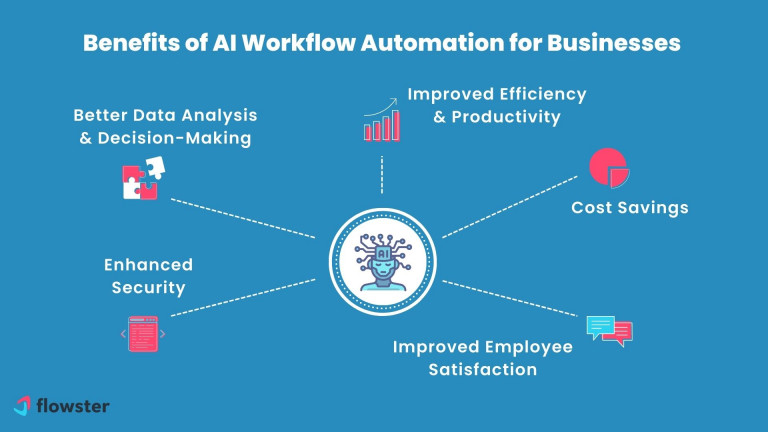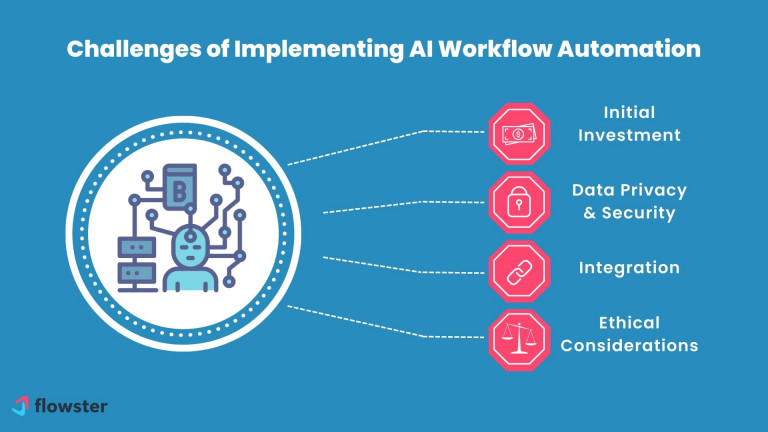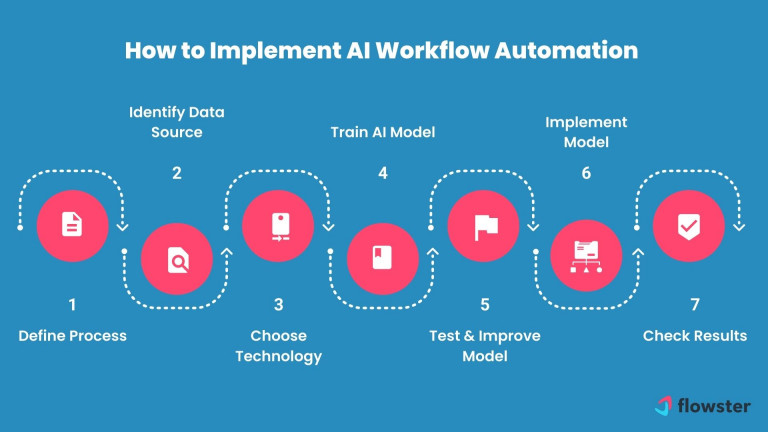Artificial intelligence (AI) has been making waves in various industries lately, and one of the areas where it has made a significant impact is in AI workflow automation solutions for business processes.
Businesses can now automate tedious and time-consuming tasks that used to be done by hand, thanks to automation software powered by AI. This lets workers focus on tasks that require human skills like critical thinking, creativity, and coming up with new ideas.
Workflow automation with AI is especially helpful for businesses with complicated workflows and processes. By automating tasks, businesses can streamline their operations, increase efficiency, create more, and reduce costs.
In this article, we’ll talk about the pros of using AI to automate business processes and the steps that need to be taken to make it happen. So, let’s dive in and discover how AI workflow automation can transform your business!
Article Outline
What is AI Workflow Automation?
Let’s start by defining AI workflow automation before we dive into its advantages.
In simple terms, AI workflow automation involves automated workflow, using artificial intelligence to automate business processes. This means using algorithms for machine learning and natural language processing (NLP) to look at data and automate processes and tasks.
Thanks to AI-powered automation software, businesses can now speed up and simplify tasks that used to take a lot of time. This means that employees can focus on tasks that require human skills like creativity, ingenuity, and critical thinking.
AI workflow automation solutions can be used for many business tasks, such as in customer service, marketing, finance, and human resources departments. However, it’s especially useful for businesses with complex workflows and procedures.
Traditional workflow automation can be time-consuming and complicated. With AI workflow automation, businesses can overcome these challenges and enjoy numerous other benefits. So let’s explore why AI workflow automation is becoming increasingly popular in the business world.
What are the Benefits of AI Workflow Automation for Businesses?
In today’s fast-paced world, businesses need to operate efficiently to stay competitive. One way to achieve this is through AI workflow automation. AI can streamline business processes and increase productivity, saving businesses time and money.
Now, let’s explore the benefits of AI workflow automation for business processes.

Improved Efficiency and Productivity
Increasing efficiency and productivity is one of the most important benefits of AI workflow automation
By automating repetitive tasks that need to be done over and over and take a lot of time, businesses can save time and effort. AI can also reduce the likelihood of human errors, which can further increase productivity.
For example, a company that uses AI to automate its customer service processes can respond to customer inquiries more quickly and accurately. This increased efficiency can lead to increased customer satisfaction and loyalty.
Cost Savings
Another benefit of AI workflow automation is cost savings. By automating repetitive manual tasks that need to be done over and over again, businesses can save time and money. This can lead to reduced labor costs and lower overhead costs.
Additionally, AI can help reduce the likelihood of errors, which can save businesses money in the long run. When there are fewer mistakes, less time and money are needed to fix them. This can help enterprise businesses cut costs even more.
Better Data Analysis and Decision-Making
AI can also help businesses analyze data more effectively, which can lead to better decision-making. AI can help businesses get insights and analysis that would be hard or impossible for humans to get. It does this by processing large amounts of data quickly and accurately.
For example, a company that uses AI to analyze customer data can identify patterns and trends that can help it improve its products or services. AI can also provide real-time insights, which can help businesses get relevant information and make decisions quickly.
Improved Employee Satisfaction
Another benefit of AI workflow automation is improved employee satisfaction.
By automating tasks that are always done the same way, businesses can free up workers to do more interesting and rewarding work. This can lead to more job satisfaction, a better balance between work and life, and more creativity and new ideas.
For example, a company that uses AI to automate its data entry processes can free up employees to work on more complex data analysis tasks. This can help them develop their skills and knowledge, which can lead to increased job satisfaction.
Enhanced Security
AI can also help businesses enhance their security measures. AI can help protect sensitive data and stop security breaches by making it less likely that people will make mistakes. Additionally, AI can help businesses comply with regulations and standards.
For example, a company that uses AI to keep an eye on its network security can find and fix potential security holes faster and better.
What Industries Can Benefit from AI Workflow Automation?
AI can be used to automate work processes in many fields, like healthcare, finance, manufacturing, retail, and logistics.
In healthcare, AI can help automate how patients are diagnosed and treated, which can lead to better outcomes for patients. And in finance, AI can automate fraud detection and risk management processes. Evidently, in the modern technological era, there is an A.I. learning resource program for almost every niche out there to assist with what would otherwise be completely manual labor.
AI can help automate quality control steps in manufacturing, which can lead to better product quality. AI can help automate the processes of managing inventory in retail, which can cut costs and make customers happier.
In logistics, AI can help automate shipping and delivery processes, which can lead to faster and more efficient delivery times.
What are the Challenges of Implementing AI Workflow Automation?
While the benefits of AI workflow automation are clear, there are also challenges and limitations to consider.

Initial Investment
For example, putting AI workflow automation in place may require a large initial investment. Additionally, AI requires technical expertise, which may be challenging for some businesses to acquire.
Data Privacy and Security
There are also concerns about data privacy and security. For AI to work well, it needs to be able to access sensitive data, which can be a security risk. Companies need to take steps to make sure their AI systems are safe and follow the rules.
Integration
Integration with legacy systems can also be a challenge. Many businesses already have systems and automated workflows in place, which can make it hard to add AI workflow automation. Businesses need to make sure that their current automated systems can work with AI systems and that data can flow easily between the two.
Ethical Considerations
Finally, there are ethical considerations to take into account. As AI is used more and more in business, there is a chance that it could replace people who work there. It’s important for companies to make sure that the pros of using AI to automate workflow are weighed against the possible cons for employees.
Case Studies of AI Workflow Automation
There are many examples of businesses that have improved their processes by using AI workflow automation. Let’s take a look at a few:
Coca-Cola
The big soda company uses AI to improve the efficiency of its sales, production, and supply chain. Coca-Cola has been able to cut down on waste and improve the quality of its products by using AI to look at data from its production and sales processes.
Ford
The automotive company uses AI to improve its manufacturing processes. Ford has been able to cut down on mistakes and speed up production by automating its quality control processes.
IBM
The technology company uses AI tools to automate its HR processes. By using AI tools to screen job applicants, IBM has been able to reduce the time and cost required to hire new employees.
Amazon
The e-commerce giant uses AI to improve its customer service processes. By using AI-powered chatbots to handle customer inquiries, Amazon has been able to respond to customer inquiries more quickly and accurately.
Netflix
The streaming service uses AI to personalize its various features and content recommendations for users. By looking at user data and tracking their behavior, Netflix is able to make personalized suggestions and features that keep people interested.
How to Implement AI Workflow Automation
AI workflow automation can be hard to set up, but businesses can see the benefits of this technology with careful planning and execution. Here are some steps to follow when implementing AI workflow automation:

Define the Process
The first step is to identify the process that will be automated. This could be a manual process that is time-consuming and repetitive or a process that saves time but requires complex data analysis.
Identify the Data Sources
The next step is to identify the data sources that will be used to train the AI model. This first data preparation could include data from existing systems, customer data, or other external data sources.
Choose the Right Technology
There are many AI technologies available, and it’s essential to choose the right one for the specific use case. This could include machine learning algorithms, natural language processing, or computer vision.
Train the AI Model
Once the data sources and technology have been identified, the next step is to train the AI model. This involves feeding the model with data and letting it learn from that data to make predictions or decisions.
Test and Improve the Model
After training the model, it’s important to test it carefully to make sure it’s making good decisions or predictions. If needed, the model can be improved by changing the data that went into it or by making small changes to the algorithm.
Implement the Model
Once the model has been tested and refined, it’s time to implement it and integrate it into the business process. This could involve integrating it with existing systems or workflows.
Check the Results
Check the results and figure out how well they worked. It’s important to keep an eye on the results of the AI workflow automation and figure out how well it worked. This will help find places where the technology could be better and make sure it is giving the expected benefits.
By following these steps, businesses can use AI solutions to automate their workflows and get the benefits that this technology platform can offer.
Transform Your Business Processes with Flowster's AI-Driven Automation
AI Workflow Automation FAQs
Is it expensive to implement AI workflow automation?
Implementing AI workflow automation can require a lot of money upfront, but the long-term benefits can make up for the costs.
Do businesses need technical expertise to implement AI workflow automation?
Yes, implementing AI workflow automation requires technical expertise. Businesses can either hire experts or partner with a vendor that specializes in AI.
How long does it take to implement AI workflow automation?
The timeline for implementing AI workflow automation will depend on the specific use case and the complexity of the process. It can take anywhere from a few weeks to several months.
What if the AI model doesn’t work as expected?
If the AI model doesn’t work as expected, businesses can refine it by adjusting the input data or tweaking the artificial intelligence algorithm.
Can AI workflow automation be customized for specific tasks, industries, or use cases?
Yes, AI workflow automation can be customized for specific industries or use cases. By teaching the AI model with data from their own industries, businesses can make the technology work best for them.
Can AI workflow automation completely replace human labor?
While AI can automate many tasks, it’s unlikely that it will completely replace human labor. Instead, AI can free up employees’ time to focus on higher-value tasks and provide support for more efficient and effective workflows.
Conclusion
In the end, AI workflow automation is changing the game for businesses by streamlining their operations and making them more efficient and productive.
With the help of machine learning algorithms and other AI technologies, businesses can cut costs, analyze data more effectively, make better decisions, improve security, and gain industry-specific benefits.
Of course, like with any new software technology, there are some challenges and limitations to consider. However, for businesses looking to improve their processes and increase their revenue, AI workflow automation software is a smart choice.
The most important parts of the implementation process are figuring out which tasks to automate, choosing the right AI technology, and testing and monitoring the AI model to make it better.
By using this technology, businesses can be more efficient, save money, make their systems safer, and open up new growth opportunities. We encourage our readers to share their thoughts and experiences with AI workflow automation in the comments section below.
Ready to Create Your First Workflow Template?
Start from scratch to make a workflow template, or look through our templates in Flowster’s Marketplace.
Want help? Use our “Done for You” service to let our experts build custom workflows for you.
Related Articles
Would you like to learn more? See our other informative articles.
How to Document Workflows for Easy and Efficient Task Management
The Complete Guide to Building Your Workflows – with Free Templates

